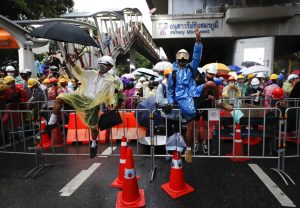Defying police orders and a draconian state of emergency decree, thousands of Thai protesters continued to take to the streets over the weekend, suggesting that the recent wave of student-led demonstrations is hardening into a protracted political struggle.
On October 18, rallies were held in at least 20 provinces, and continued to simmer for the fifth straight day in the capital Bangkok, where protesters evaded the authorities by employing evasive tactics borrowed from Hong Kong’s pro-democracy movement.
The demonstrations are the latest in a wave of public protests that began earlier this year, growing in turn from an incipient opposition to the country’s last military coup d’etat in May 2014. Brandishing a three-fingered salute from “The Hunger Games” film franchise, student protesters are calling for the resignation of former junta leader Prime Minister Prayut Chan-o-cha, who led the 2014 coup. They also want the drafting of a new constitution, arguing that the junta-written document unfairly benefited Prayut at national elections in March 2019.
Most remarkably, student activists have knit these questions into broader calls for the reform of the Thai monarchy, the linchpin of the country’s lopsided distributions of wealth and power. Such criticisms have explosive implications in Thailand, where the reputation of the monarchy and royal family is ring-fenced by a harsh lese-majeste law that carries prison terms of up to 15 years.
The current cycle of confrontations began with planned demonstrations on October 14, the 47th anniversary of the 1973 student-led uprising that culminated in the downfall of the military government of Field Marshal Thanom Kittikachorn. The situation escalated the following morning, when police broke up an overnight rally outside Prayut’s office, shortly after declaring a “severe” state of emergency designed to prevent further demonstrations.
Instead, the state of emergency decree led to further antigovernment mobilizations. Following the arrest of key protest leaders – as well as two young activists who were slapped with the archaic charge of “violence against the queen” after heckling a motorcade carrying Queen Suthida on October 14 – more demonstrations erupted spontaneously in the Thai capital. At one flash protest at Bangkok’s Pathumwan shopping district, police used water cannon laced with blue dye and an apparent teargas chemical to break up the crowds. As of October 18, at least 80 activists had been arrested.
When the authorities tried to keep people from gathering by selectively shutting down stations on Bangkok’s Skytrain mass transit system, protest organizers urged followers to who up at Skytrain stations across the city. The authorities subsequently ordered all stations to be closed. The October 18 gatherings eventually came to center on the massive traffic circle running around Victory Monument, which commemorates Thailand’s tepid victory against a war-weakened France in 1940-41.
One of the most remarkable aspects of the protests over the past few days has been the echoes of Hong Kong’s recent pro-democracy demonstrations. After the use of water cannons on October 16, many protesters donned hard hats and goggles as a precaution and, like their comrades in Hong Kong, formed human chains to distribute umbrellas to protesters.
Crossborder solidarities between Hong Kong and Thai students have grown in recent years, based on a perception of a common fight against stifling authoritarianism. Online, activists have used the hashtag #milkteaalliance to express support for their respective struggles, a movement that has also drawn support from people in Taiwan. At some of the weekend’s protests, Thai demonstrators reportedly chanted, “Hong Kong is a country, return independence to them.”
In a message over the weekend, Hong Kong democracy activist Nathan Law lauded the courage of the Thai protesters. “The structure of the problem is different but at the end of the day we see a lot of parallels between these two cases,” The Guardian quoted him as saying, in reference to the use of water cannons and the shutdown of the transport system to stifle mass gatherings. “These little tricks share the same color.”
These clashes suggests that the current protest movement is shaping up as more vigorous challenge to Thailand’s ruling elites than any since the rise of Thaksin Shinawatra in the aftermath of the 1997 Asian financial crisis.
It also suggests a mounting legitimacy crisis for the Thai monarchy and the wealth and privilege that has accumulated, barnacle-like, around the institution of the palace. As I argued in these pages last month, the late King Bhumibol Adulyadej, who reigned from 1946 until his death in 2016, offered relatively sturdy foundations for the fabrication of Thai royalist ideology after World War II. Revered by much of the population (if not universally), he projected a degree of gravitas and moral seriousness that lent weight to official propaganda depicting him as the supra-political embodiment of the Thai nation.
With the accession to the throne of King Maha Vajiralongkorn since 2016, however, the edifice of wealth and power has been placed on more rickety foundations. Spending most of his time in Germany, where his presence has recently become the subject of local controversy, the king has recently come under scrutiny for his lavish spending and inaction during the COVID-19 pandemic. With an unpopular monarch on the throne, and Thailand’s economy facing the sharpest drop-off of any Southeast Asian nation due to the COVID-19 pandemic, the country looks set for a long dry season of protest.













